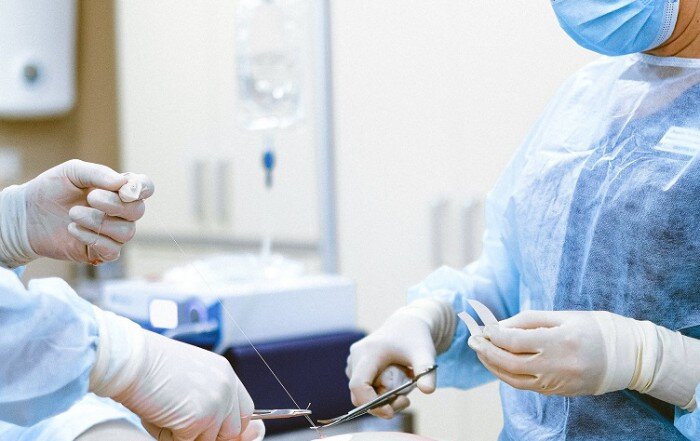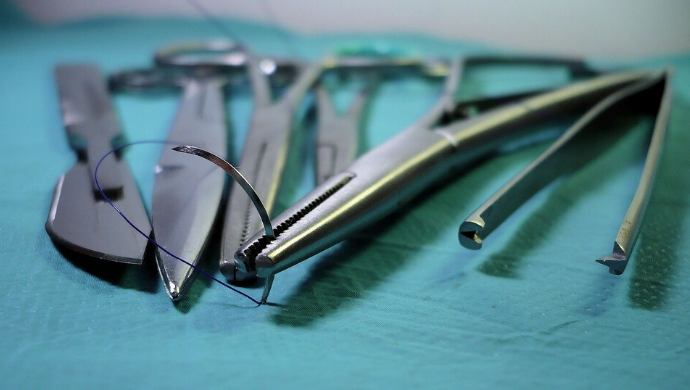The Value of Virtual Simulation: Drawing From 20 Years of Experience
In 1992, Becky Larson was a young mother of three, looking for a job that allowed her to work remotely. Because options for virtual work were limited at the time, she found herself in the world of medical transcription, which ultimately led her to a variety of roles in medical simulation. She quickly became passionate about the work and the technology’s ability to allow students to practice their skills in a safe environment.
Role Reversal: Admissions Reps Become Students for a Day
Several years ago, enrollment for the surgical technology program was down at the University of St. Francis (USF). In need of new avenues to recruit students, Surgical Technology Program Director Theresa Sorgen-Burleson, MBA, CST, turned to her admissions team. But rather than ask to increase their efforts, she sought to help them understand the profession.
Solutions for Socially Distant Labs and Tips for PPE
In light of the need for social distancing, ARC/STSA asked instructors to share their solutions and protocols for lab rotations and other activities that usually involve hands-on instruction. We also asked for suggestions on how to obtain protective personal equipment (PPE) for students when it is not made available at clinical sites. What follows is a compilation of ideas and tips we received.
Tips for Hosting Effective Virtual PAC Meetings
The COVID pandemic has forced us to rethink how we keep our programs moving forward during such a challenging time. Our lecture content, lab competencies and clinical hours tend to be our highest priority; however, there are many other moving parts to a successful program, including maintaining a strong Program Advisory Committee (PAC).
Conducting a Virtual Orientation for New Students
This fall, many cohorts will find themselves not only starting a new program, but also becoming immersed in a virtual environment — some even for the first time. How can educators and faculty help set up students for success from the start in this new reality? ARC/STSA spoke with Heather Phillips, coordinator of student services at Reading Hospital School of Health Sciences, on how their program is helping new students feel welcomed in this challenging time.
Honing Your Craft — From OR to Classroom
Surgical technologists and surgical assistants who answer the call to be educators are not always trained as such. We come as skilled practitioners who have dedicated years to perfecting our craft, ensure each surgical procedure runs as smoothly as a philharmonic symphony. As educators, we all strive to bring that same passion, effort and dedication to the instruction of our students.
Going the Distance: What We Can Learn from Distance Education Specialists
As instructors acclimate to online learning, they have been identifying methods and tools that work best for their students in real-time. For distance educators, the concept is not so new. We spoke with two experts in the field to understand what can be learned from their experience regularly working in a remote teaching environment.
Breaking Down Barriers: Best Practices for Student Retention
As program directors and instructors, we know the many challenges of running a surgical technology program. What we don’t always know is what our students might be going through outside the classroom. This requires educators and student support systems to use a variety of tools to meet the needs of students.
Be Part of the Self-Care Evolution
At the Louisiana State Assembly Educational Workshop in March, Dr. Elise Juergens, a perioperative circulating nurse turned scholar, brought to light that we are all guilty of overlooking our own self-care. Lack of self-care quickly leads to burnout, and given the tumultuous environment currently being experienced with the COVID-19 pandemic, her message could not have been received at a more valuable time.
Transition to e-Learning: One Educator’s Resource to Keep Students Engaged
Keeping students engaged in the classroom is among an educator’s top priorities. With the transition to online learning in light of COVID-19, this has become paramount. In this Q&A, hear from Mayo Clinic's Helga Olson, CSA, CSFA, MS, on how she uses Pear Deck, an online, interactive tool, to enhance her student's experience. At the time of writing, Olson was using the tool in-person, but it can also be used online as students learn remotely.
Revising the Lesson Plan: Advice on Moving Your Students and Faculty Forward
School and clinical closures have caused institutions to quickly assess how to help their students learn in a new, virtual environment. We spoke with Logan Threet, CST, to understand how his institution made the transition, as well as how he collaborated with other organizations to keep their semester going strong. Gain his perspective on the situation, as well as resources for your organization during this challenging time.
Grants 101: What a Grant Specialist Wants You to Know
One area in which new surgical technology program directors can enhance their programs is through grants. At Madisonville Community College, I have been very fortunate to work with David Schuermer and Craig Dixon, two grant specialists who frequently lend their expertise and insight when it comes to all things grants. Through their efforts, we have been able to obtain items for the surgical technology program that have enhanced the students’ learning experience.
Think Outside the Book: Trauma Alert
Think Outside the Book is a series that features creative teaching techniques. In this edition, Crystal Warner, dean of surgical technology at Zenith Education Group, shares how she keeps her students prepared for anything – in real-time, at any time.












